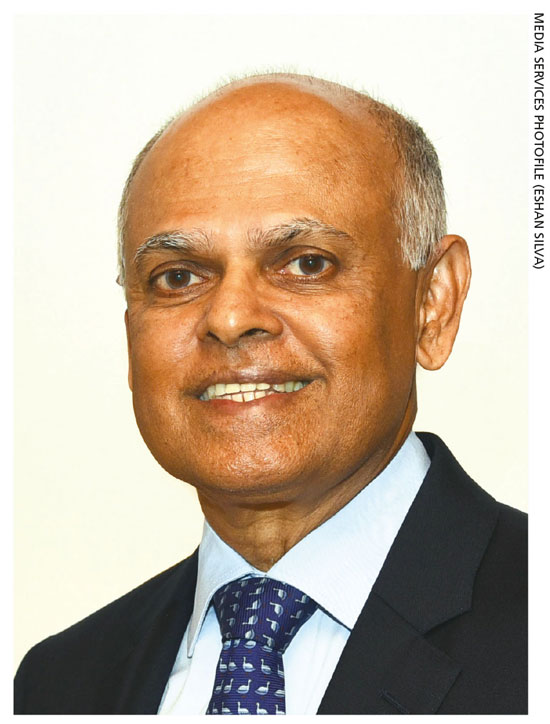TEA INDUSTRY
Compiled by Sandesh Bartlett
BREWING THE PERFECT CUPPA
Lallith Ramanayake assesses the post-pandemic future of the tea industry
Q: What changes do you predict for the tea industry as a result of COVID-19?
A: During the curfew, tea auctions continued due to the transition from a physical call over system to an automated platform, thanks to the Colombo Brokers’ Association.
Tea production too was uninterrupted, and supporting sectors such as transportation, banking, warehousing, customs and port operations functioned smoothly. Only the packaging sector faced minor delays.
These segments and the entire supply chain need to function smoothly, and adapt to the ‘new normal’ such as working from home (WFH)  where applicable, having varied business locations to overcome selective lockdowns, increased digitisation, working in zones and addressing any health issues among employees.
where applicable, having varied business locations to overcome selective lockdowns, increased digitisation, working in zones and addressing any health issues among employees.
The sample distribution by brokers, and ability of the trade in Colombo to taste and evaluate each and every tea, will be crucial. This would instil confidence in overseas buyers and can increase or sustain demand accordingly.
Q: How do you view the present landscape of the tea industry vis-à-vis cheap tea?
A: Tea is a cheap beverage worldwide except in niche markets. Cheaper teas are available from countries of other origin.
Producers need to look at a lower cost of production as well as improved quality to remain viable. Ceylon Tea has always been in demand and will continue to be so.
Q: What are the main strengths and weaknesses of the industry?
A: Low yields are concerning and there is insufficient replanting. The tea industry also suffers from worker shortages and therefore, low productivity. This is compounded by the ban on the weedkiller, glyphosate.
There’s insufficient knowledge on tea manufacturing with producers being too crop or product (grade) oriented without being market oriented. Furthermore, there is hardly any seasonal quality – and insufficient product quality at other times.
However, Ceylon Tea continues to witness strong demand and commands a higher price than other origins. The ability to sustain an uninterrupted supply even through an insurrection, war and COVID-19 has also instilled confidence among overseas buyers.
The auction system, bylaws and efficient sample distribution by brokers are the strengths. And the supporting sectors of transport, warehousing, banking, packaging and customs, as well as the high degree of value addition compared to competitors, are bonuses.
Q: Is the industry garnering recognition given its importance to the national economy?
A: Not adequately. The industry brings in circa US$ 1.3 billion in export revenue and high employment, and contributes extensively to supporting industries.
But it was considered a twilight industry a few years ago. Banning glyphosate without evidence has resulted in a drop in production. The lack of support for the Tea Research Institute of Sri Lanka (TRI), Tea Small Holdings Development Authority (TSHDA) and Sri Lanka Tea Board has taken its toll.
Successive governments have interfered with worker welfare benefits despite a collective agreement that included the Employers’ Federation of Ceylon (EFC), which is a reason for the high cost of production.
Q: What can the tea industry do to address issues regarding labour and fair wages?
A: The plantations industry needs to fast track housing to offer decent accommodation, and instil employee satisfaction through job title and attire, motivation via job enrichment by way of wider job roles – such as plucking tea in the morning and IT-based work in the afternoon.
This should ensure a reverse migration of workers back to estates. Employees need to work adequate hours in a day and month. Wages should be productivity-based and labour unions need to enable worker mobility between estates.
Q: How should Ceylon Tea be marketed in the future?
A: International marketing of Sri Lankan brands will lead to competitive advantages. Promotional funds to promote more sales of pure Ceylon Tea along with international brand marketing are the way forward.
However, facilitation of such sales is important too since this will be a costly and long-term process; and as a substantial volume of worldwide sales are multi-origin blends, the demand for Colombo auctions increases.
Lastly, having high product quality throughout the year, adhering to required maximum residue limits (MRLs) and quality assurance are important.
The brand promise of Ceylon Tea is that of a high quality and clean tea, without additives and preservatives, and this must be maintained through policing and deterrent punishments for errant producers or traders.






Leave a comment